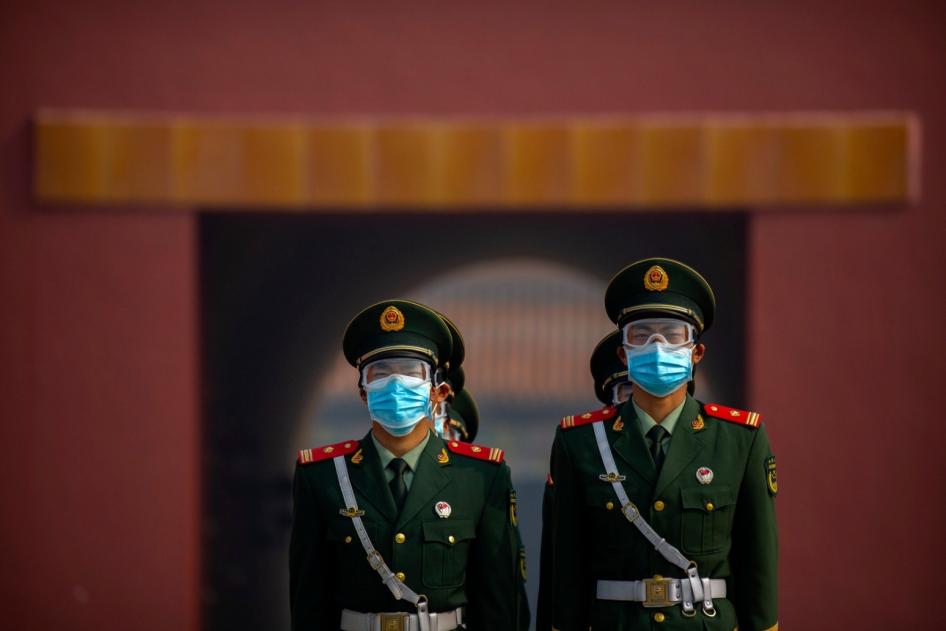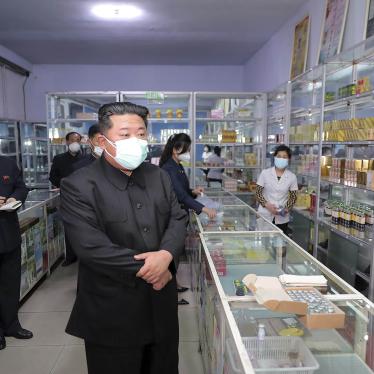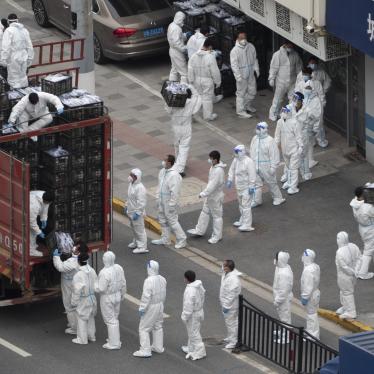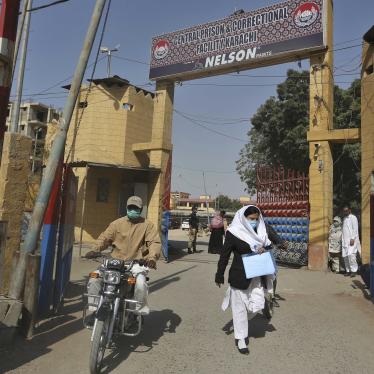(New York) – The Chinese government should cease its campaign against individuals seeking redress for abuses linked to the Covid-19 pandemic, Human Rights Watch said today. The authorities have harassed and intimidated those who have sought accountability for the government’s initial coverup of the pandemic and for abuses stemming from lockdowns, including lack of access to medical care and other excessive restrictions.
Activists and lawyers who assisted those seeking redress said that strengthened surveillance and the near elimination of anonymity in Chinese messaging apps, like WeChat, have helped the authorities to pre-empt activism earlier than they could in previous public health crises.
“The Chinese government’s narrative that it has won the Covid-19 ‘war’ is conditioned on silencing those who speak out about failings in the government’s pandemic response and abuses committed under the pretext of stopping the spread of the virus,” said Yaqiu Wang, China researcher at Human Rights Watch. “Repressing victims of abuses and their families is a cruel addition to the harm they’ve already suffered.”
To contain the spread of the coronavirus, the Chinese government, from late January to early April 2020, imposed draconian measures to restrict movement in Wuhan, a city of 11 million people, by suspending planes and trains leaving the city, and buses, subways, and ferries within it. In July and August, authorities imposed similar restrictions on millions of residents in the northwest region of Xinjiang after identifying hundreds of infections.
International human rights law requires that government restrictions on rights for reasons of public health be lawful, necessary, and proportionate. When quarantines or lockdowns are imposed, the authorities are obligated to ensure access to food, water, health care, and care-giving support.
Chinese authorities committed abuses under the pretext of Covid-19 lockdowns, Human Rights Watch said. Officials were seen sealing apartment doors to prevent people from leaving their homes. Some residents were chained to metal posts for purportedly violating stay-at-home orders. Videos circulated online showed residents yelling from their homes in despair. In Xinjiang, authorities forced some residents to drink traditional Chinese medicines.
While the Chinese government appears to have brought the coronavirus under control through these draconian measures, many of those who survived have demanded accountability for the government’s initial coverup and abuses associated with the lockdowns, such as lack of access to medical care and other life necessities.
Zhang Hai’s father died from Covid-19 in February after being infected at a Wuhan hospital where he was seeking treatment for a broken leg. Zhang spoke publicly about his father’s death and filed a lawsuit against the Wuhan government in April, arguing that had the government not downplayed the virus, his father would have avoided going to the hospital and would not have been infected. Since then, the authorities have continually harassed Zhang. Government minders followed him on the street, and his social media accounts were suspended. The police warned him that he would be detained if he kept speaking out.
In February, Wuhan resident Yang Min’s 24-year-old daughter died from Covid-19 after being infected at a hospital where she sought treatment for an unrelated illness. After the lockdown in the city was lifted in April, Yang protested on the street and petitioned government offices, demanding the government to disclose what it had known about the virus. Police repeatedly thwarted her efforts. Community officials also locked the gates of Yang’s residential compound to prevent her from leaving.
The mother of Wuhan resident Li Yi, a pseudonym, died from Covid-19 in February. Li consulted activists and lawyers via WeChat about filing a lawsuit against the Wuhan municipal government, believing the lockdown measures made it extremely difficult for his mother to get to a hospital for treatment. In May, Wuhan police frequently summoned Li to the police station, forcing him to drop the lawsuit and warning him not to criticize the government online or to speak to “enemy foreign media,” according to an activist who assisted Li and who spoke to Human Rights Watch.
Yao Qing, a former business consultant in Wuhan, suffered from depression and an arm injury from a previous dispute with government officials over subway construction near her home. She said that during the lockdown, local officials ignored her repeated calls for help to buy necessary medications. In October, Yao tried to bring a lawsuit against authorities for negligence, prompting Wuhan police to threaten that she would be forcibly disappeared if she persisted.
In some cases, police intimidated relatives of critics, including elderly parents and children, when the critics refused to stop their efforts, people familiar with the cases told Human Rights Watch. The police ransacked one critic’s home and threatened his elderly mother. Police also threatened to expel a critic’s child from school.
Activists, lawyers, and journalists in China told Human Rights Watch they believe there are fewer cases of people speaking out or seeking redress for Covid-19 related abuses than for previous public health crises or natural disasters involving alleged government malfeasance, such as the Sichuan earthquake and poisoned milk powder scandal in 2008, and the Tianjin chemical explosion in 2015. Beyond the practical difficulty in demonstrating government wrongdoing in Covid-19 cases, a mix of factors, including increased surveillance, media and internet censorship, and repression of civil society groups, has enabled the government to more quickly stamp out criticism. Ever-increasing punishments, including lengthy sentences to people who sought redress in recent years, have also dampened activism.
The police warned human rights lawyers and activists not to comment on the coronavirus outbreak on the internet or to assist people seeking redress for Covid-19 related abuses. Later, officials at justice bureaus across the country summoned human rights lawyers and warned them of the “three bans and six forbids,” (三严禁, 六不讲), which include forbidding them from giving legal advice to families of those who contracted Covid-19, speaking to foreign media, and signing petitions.
Yang Zhanqing, a New York-based activist who assisted many families seeking redress for lost loved ones, told Human Rights Watch that several members of his China-based family have been summoned by the police for questioning in relation to his activism. In October, his father was fired from his logistics job at a construction site. Yang said the government told his relatives that he has been designated by the government as a “traitor.”
Since the outbreak in Wuhan, authorities detained several citizen journalists who reported from Wuhan. A court in Shanghai sentenced Zhang Zhan to four years in prison after convicting her of picking quarrels and provoking trouble. The situation and whereabouts of Fang Bin, a businessman in Wuhan who has been detained for posting videos of city hospital, remain unknown. Beijing-based activists Chen Mei and Cai Wei, whom the police detained in April for archiving censored Covid-19-related information, remain in a detention center awaiting trial.
According to official figures, more than 4,000 people in China have died from Covid-19. Some commentators have estimated that the actual number could be much higher. The number of people who have died due to the lack of access to medical care and other necessities during the lockdowns is unknown.
“The Chinese authorities’ relentless surveillance, censorship, and prosecution of those critical of the government’s response to the pandemic means there may never be an honest accounting of the government’s role,” Wang said. “People’s rights to redress and information need to be respected if there are to be effective reforms.”
|
News Release
China: Seekers of Covid-19 Redress Harassed
End Intimidation, Surveillance of Those Critical of Government Response
Your tax deductible gift can help stop human rights violations and save lives around the world.
Region / Country
Tags
Topic
Most Viewed
-
November 25, 2019
A Dirty Investment

-
June 3, 2025
“They’re Ruining People’s Lives”

-
January 25, 2024
“We’re Dying Here”

-
April 27, 2021
A Threshold Crossed

-
November 19, 2012
Losing Humanity




